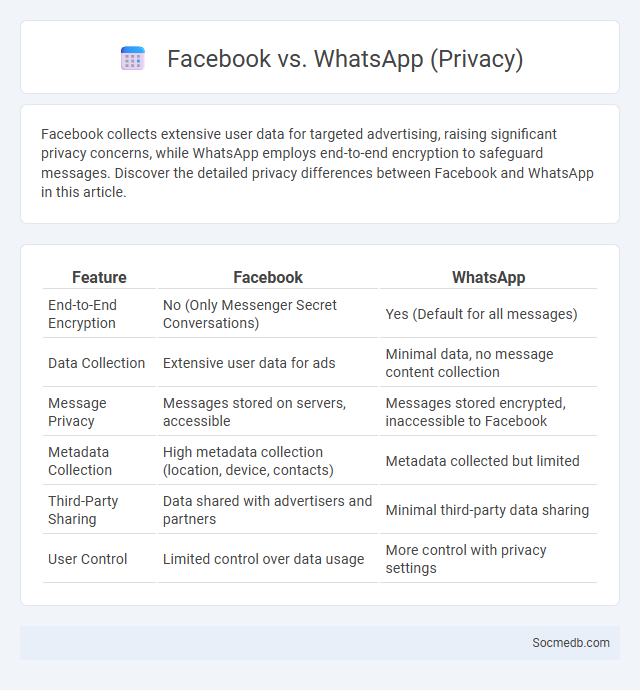
Photo illustration: Facebook vs WhatsApp (Privacy)
Facebook collects extensive user data for targeted advertising, raising significant privacy concerns, while WhatsApp employs end-to-end encryption to safeguard messages. Discover the detailed privacy differences between Facebook and WhatsApp in this article.
Table of Comparison
| Feature | ||
|---|---|---|
| End-to-End Encryption | No (Only Messenger Secret Conversations) | Yes (Default for all messages) |
| Data Collection | Extensive user data for ads | Minimal data, no message content collection |
| Message Privacy | Messages stored on servers, accessible | Messages stored encrypted, inaccessible to Facebook |
| Metadata Collection | High metadata collection (location, device, contacts) | Metadata collected but limited |
| Third-Party Sharing | Data shared with advertisers and partners | Minimal third-party data sharing |
| User Control | Limited control over data usage | More control with privacy settings |
Introduction: The Privacy Debate of Facebook and WhatsApp
Facebook and WhatsApp have sparked intense privacy debates due to their extensive data collection and sharing practices. Users' personal information is frequently scrutinized, raising concerns about data security and unauthorized access. Your privacy decisions must consider the implications of using these platforms in today's digital landscape.
Understanding Facebook’s Data Privacy Policies
Facebook's data privacy policies outline how your personal information is collected, used, and shared across its platform to protect your digital privacy. Understanding the specifics, such as data retention periods and permissions for third-party app access, empowers you to control your information and adjust your privacy settings effectively. Ensuring awareness of these policies helps you navigate Facebook's ecosystem securely and maintain control over your data.
WhatsApp’s Approach to User Privacy and Encryption
WhatsApp employs end-to-end encryption to ensure that messages, calls, photos, and videos remain private between users, preventing interception by third parties, including WhatsApp itself. The platform uses the Signal Protocol, a highly regarded cryptographic protocol, to secure all communications, enhancing user confidentiality and trust. Privacy settings allow users to control who can see their profile information, last seen status, and read receipts, further strengthening user data protection.
Data Collection: Facebook vs WhatsApp
Facebook collects extensive user data including demographics, interests, location, and online behavior to tailor ads and improve platform algorithms. WhatsApp limits data collection to phone numbers, contacts, and usage logs, emphasizing end-to-end encryption and user privacy. Facebook's data collection is more comprehensive due to its advertising-driven business model, while WhatsApp prioritizes minimal data harvesting to protect user communication.
Major Data Breach Incidents: Facebook and WhatsApp
Major data breach incidents at Facebook and WhatsApp exposed millions of users' personal information, including phone numbers, email addresses, and private messages, highlighting critical vulnerabilities in social media security. The 2019 Facebook breach compromised over 500 million accounts, while WhatsApp faced zero-day exploits allowing attackers to install spyware through calls. Protecting Your data on these platforms requires regularly updating security settings and staying informed about emerging threats.
Impact of Data Breaches on User Trust
Data breaches significantly undermine user trust by exposing sensitive personal information, leading to increased fear of privacy violations and identity theft. Companies experiencing such breaches often see a sharp decline in user engagement and retention, as users become hesitant to share data or use affected platforms. Safeguarding Your information with robust security measures is crucial to maintaining trust and ensuring continued user loyalty.
User Control Over Personal Information
Social media platforms increasingly prioritize user control over personal information by implementing granular privacy settings that allow users to manage data sharing and visibility. Enhanced data encryption and transparent policies empower users to decide how their information is collected, stored, and used. These measures reduce risks of unauthorized access and reinforce digital privacy in online communities.
How Facebook and WhatsApp Respond to Data Breaches
Facebook and WhatsApp implement robust security protocols to swiftly identify and address data breaches, minimizing potential harm. They notify affected users promptly, offering guidance on protective measures and enhancing system safeguards to prevent future incidents. Your data privacy is prioritized through continuous updates to encryption and monitoring technologies, ensuring stronger defense against cyber threats.
Comparing Security Features: End-to-End Encryption
End-to-end encryption ensures that only you and the intended recipient can access the content of your messages, providing superior security compared to standard encryption methods used on many social media platforms. Apps like WhatsApp and Signal offer robust end-to-end encryption by default, preventing third parties, including platform providers, from intercepting conversations. Evaluating these security features is crucial when choosing a social media service to protect your privacy effectively.
Conclusion: Protecting Your Privacy on Social Media
Protecting your privacy on social media requires implementing strong security measures such as using unique, complex passwords and enabling two-factor authentication. Regularly reviewing privacy settings and being cautious about the personal information shared can significantly reduce the risk of data breaches and identity theft. Awareness of social media platform policies and staying informed about emerging threats are essential for maintaining online security and safeguarding personal data.
 socmedb.com
socmedb.com